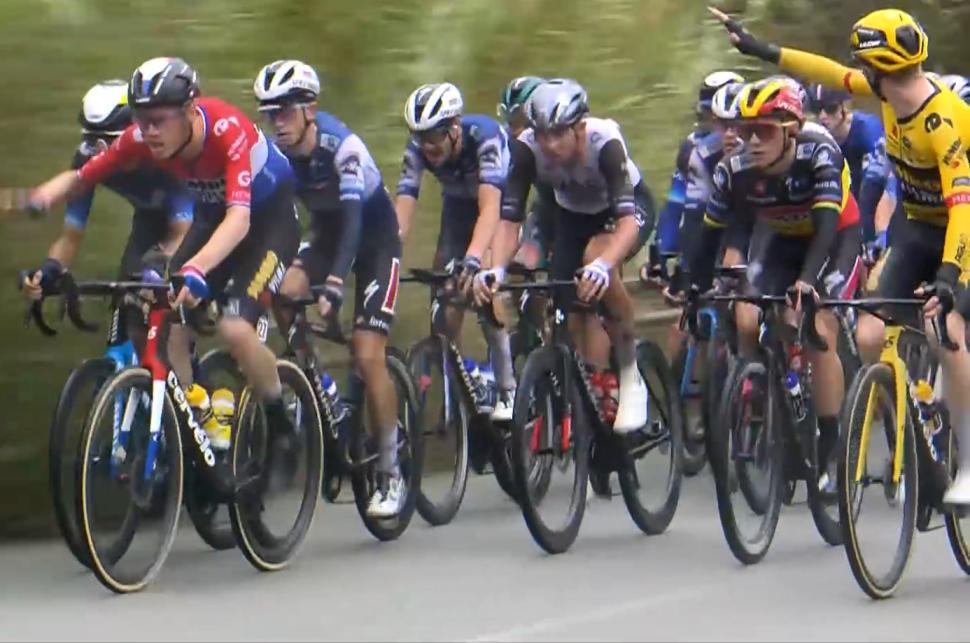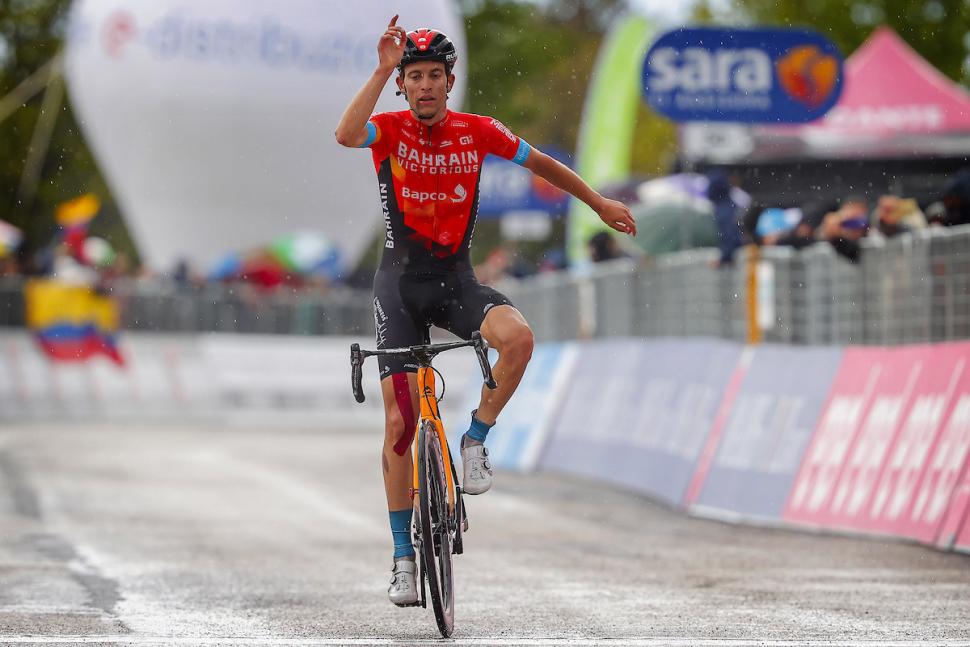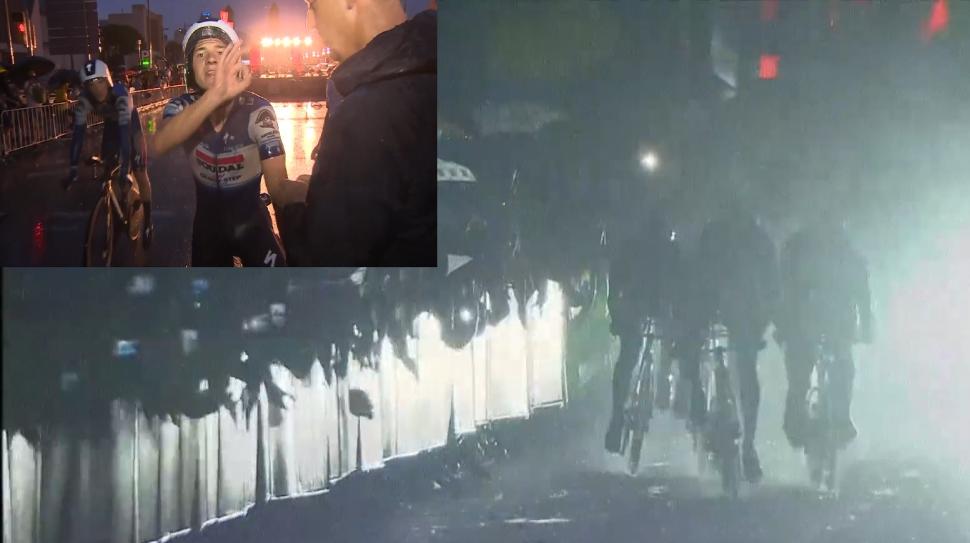- News
- Reviews
- Bikes
- Accessories
- Accessories - misc
- Computer mounts
- Bags
- Bar ends
- Bike bags & cases
- Bottle cages
- Bottles
- Cameras
- Car racks
- Child seats
- Computers
- Glasses
- GPS units
- Helmets
- Lights - front
- Lights - rear
- Lights - sets
- Locks
- Mirrors
- Mudguards
- Racks
- Pumps & CO2 inflators
- Puncture kits
- Reflectives
- Smart watches
- Stands and racks
- Trailers
- Clothing
- Components
- Bar tape & grips
- Bottom brackets
- Brake & gear cables
- Brake & STI levers
- Brake pads & spares
- Brakes
- Cassettes & freewheels
- Chains
- Chainsets & chainrings
- Derailleurs - front
- Derailleurs - rear
- Forks
- Gear levers & shifters
- Groupsets
- Handlebars & extensions
- Headsets
- Hubs
- Inner tubes
- Pedals
- Quick releases & skewers
- Saddles
- Seatposts
- Stems
- Wheels
- Tyres
- Health, fitness and nutrition
- Tools and workshop
- Miscellaneous
- Buyers Guides
- Features
- Forum
- Recommends
- Podcast
news
 Jumbo-Visma slow Vuelta peloton in protest of safety issues at Vuelta a España (GCN)
Jumbo-Visma slow Vuelta peloton in protest of safety issues at Vuelta a España (GCN)"Profound safety problem" in elite cycling, finds report... but riders union president says it's "getting safer"
As the road cycling season comes to a close, calls to focus on the safety of the peloton have only increased following a number of high-profile crashes, organisation pitfalls and the tragic death of Gino Mäder, and in the wake of it all, a report has said that elite cycling has a "profound safety problem", with safety "taking a backseat in the pursuit of performance or profit".
The report comes from City, University of London and Dublin City University (DCU) and says that in recent years, "incidents in pro cycling have endangered the lives of cyclists, fellow competitors and spectators on the road and the track, but with relatively little response on how to improve safety".
Dr Cormac Bryce, a senior lecturer in Insurance and Risk at City, said: "Put simply, elite cycling has a safety problem, and the issue has recently found itself central to discussions of professional cycling due to a crash at the 2022 Commonwealth Games Track event that saw numerous riders and bikes enter the crowd at high speed.
"Other incidents include Stage 1 of the 2023 Vuelta a España being conducted in the dark, the cancellation of the CIC-Tour Feminin International des Pyrénées 2023 for safety concerns, and the tragic death of cyclist Gino Mader at the Tour De Suisse."
> Swiss pro cyclist Gino Mäder dies after horrific Tour de Suisse crash
"To shed light on this area, we are the first to investigate safety within elite cycling by applying safety culture theory to the now infamous Australian Cycling Olympic incident that saw Alex Porter’s handlebars snap clean off during the competition. The results reveal a concerning lack of adherence to rules, the existence of light-touch regulation, and inadequate management safety attitudes.
"As a result, there is a need for immediate improvement at a governing level, as there are distinct parallels between the incident and high-profile failures in other industries. We consider this paper as the foundation for new and exciting academic research in this area as those conversations evolve."
> Tour Féminin des Pyrénées stopped amidst rider safety issues
Professor Michael Dowling, from DCU Business School and a co-author of the paper, said: "Our study unearths a systemic issue that goes beyond the realm of sports and penetrates the corporate world: the notion that safety can take a back seat in the pursuit of performance or profit.
"From the track to the boardroom, the lessons are clear—when safety culture is not fundamentally woven into an organisation’s DNA, the ramifications can be catastrophic.
"The risks faced by elite cyclists parallel those in high-stakes industries, like oil and gas, where lapses in safety protocols can lead to disaster. This research serves as a wake-up call for all sectors, calling for a renewed commitment to safety governance. It’s not just about cyclists; it’s about reimagining how we prioritise safety in every facet of life."
> "Disgrace": Pro riders rip into UCI over "unacceptable" speed bump sprint crash
Meanwhile, Adam Hansen, former pro and president of CPA, the riders' union recognised by the governing body of pro cycling UCI, said in an interview to Eurosport that cycling is a "dangerous sport" and while they are trying to make it safer, "it'll never be safe".
"They [riders] have to be educated better to know it’s a dangerous sport, and take this chance and risk," said Hansen.
Referring to the opening team time trial stage at the Vuelta a España this year, in which the attempt to make riders cross the finish line at the golden hour of dusk was completely washed over by the torrential downpour leading to the teams instead finishing in pitch black conditions, Hansen said that he was "upset with the UCI".
He said: "There was some talk like why didn’t the riders stop, why didn’t the teams stop. But if you were to negotiate with the organisers UCI, they can just say, 'You can start, you don’t have to. If you don’t finish then you don’t start the next day.'"
> More safety concerns as Vuelta a España pros left to ride through Barcelona in dark after "ridiculous" opening stage
Last year's winner of the Grand Tour Remco Evenepoel had slammed the decision as "ridiculous" and said that "they couldn't see anything".
"You have the whole day to do a team time trial," he said. "We have to wait the whole day when it was dry. Rain is rain, we cannot change the rain, but we can change the circumstances that we race in.
"Today what the organisation should know is that it's dangerous and they should think about safety... yeah, just a shame, it affects everybody. All the GC teams went super slow because you couldn't see anything, you couldn't race at 100 per cent... it's just strange that they let us race in the dark like this."
The next day, with the rain coming down even worse, two-time Tour de France winner Jonas Vingegaard said before the race: "I don’t know if it’s the organisation or whoever it is, but it seems like they don’t care about our safety at all."
Hansen, talking about the stage two situation at the Vuelta, told Eurosport: "We started negotiations the night before. We asked what was actually happening in the end, and we were shot back. It’s good when the riders take it into their hands and say yesterday was super dangerous, today we want to make it more safe.
"That’s the thing, when you deal with organisers when they think you’re not united, they don’t take the negotiations seriously. But when they see you’re united, they listen very quickly."
And then there was the Stefan Küng crash last month at the European time trial championships, with the Swiss TT specialist hitting the deck and finishing the race with a cracked helmet, bloodied face and suffering a concussion.
Hansen said: "In TT there’s only one way communication, the team car can speak to the rider but the rider cannot say how he feels. If the rider is riding and going at maximum and from the car’s view it looks fine. But then when he crossed the finish line, it looked super bad.
"That’s why we have to think of a way to make sure that riders don’t do that."
The Australian triathlete said that there was a safety group getting started which has been working hard to make sure that all the orgnaisers are following the UCI regulations and guidelines and make sure that UCI is enforcing them.
He said: "Just by asking if the riders felt safe, watching everything, making sure the finish line is wide enough, checking if there’s enough motorbikes and convoys, if they can get to the front, how can we find better solutions
"Organisers have been reaching out and showing all the work they’ve done. In the last two weeks of the Vuelta they were trying to outmatch other races with the safety nets and padding. So riders have been saying it’s more safe, organisers are trying a lot more.
"The future’s going to get a lot safer I believe, but at the moment we definitely need public awareness and the pressure on the organisers to make it more safe. In my opinion it’s getting safer, that’s for sure."
Adwitiya joined road.cc in 2023 as a news writer after graduating with a masters in journalism from Cardiff University. His dissertation focused on active travel, which soon threw him into the deep end of covering everything related to the two-wheeled tool, and now cycling is as big a part of his life as guitars and football. He has previously covered local and national politics for Voice Wales, and also likes to writes about science, tech and the environment, if he can find the time. Living right next to the Taff trail in the Welsh capital, you can find him trying to tackle the brutal climbs in the valleys.
Latest Comments
- mdavidford 2 sec ago
In this case, though, it doesn't seem to unreasonable, because it doesn't seem to be dependent on it - the stands still look perfectly usable on a...
- chrisonabike 5 min 35 sec ago
It's like the joke, isn't it?...
- chrisonabike 12 min 42 sec ago
Ah, but: in UK, if a motorist drives into you (or simply parks in a cycle lane, forcing you out into the path of another motorist) then the council...
- Geordiepeddeler 1 hour 2 min ago
Why is it stupid? Please explain.
- hawkinspeter 1 hour 15 min ago
You're right. I just use the main Long Ashton Rd to get between the A370 and Ashton Court/B3128. Looking at a map, Festival Way doesn't go far...
- hand0j1n 15 hours 32 min ago
Hopefully the new device is a big success, but wahoo do have a lot work to do in terms of convincing that their quality control has improved. ...
- chrisonabike 14 hours 22 min ago
Agree that the moaning comes from a place of priveledge and ultimately "if only there weren't so many other people driving"....
- Simon E 16 hours 8 min ago
Have added some clarification....
- Simon E 16 hours 17 min ago
I was tempted to try Galibier gloves but opted for Endura Freezing Point from LBS last year. Not cheap (£60, I think). I'd prefer a shorter cuff...
- Simon E 16 hours 55 min ago
I can't wait that long! Here's a series that any good vlogger / 'grammer would surely recognise....



Add new comment
4 comments
Surely pro cycle racing is incredibly safe now that they wear helmets?
talk about stirring the pot...
crash at the 2022 Commonwealth Games Track event that saw numerous riders and bikes enter the crowd at high speed
Only one rider left the track during the whole event. Poor evidence and poor reporting
Factually, that is correct. Only 1 rider went over the barrier. However, looking at the video / stills shows a Canadian rider right behind also right on the bar at the top of the wall, ad only not going into the crowd by an utter miracle. So yeah, it does need something, something that doesn;t stangle the racing. Perspex screens, as used in Ice Hockey for example can stand up to a puck travelling > 100mph, a cyclist is a much more diffuse impact, so they should also work for us, assuming they;re securely enough fitted to stop the whole shebang folding onto the spectators. https://www.bbc.co.uk/sport/commonwealth-games/62416489
Not sure why Dr Bryce includes poor Gino Mader's death as part of the evidence of a safety problem, unless I've missed something I thought it was generally agreed to be a tragic but unforeseeable accident of the sort that can't be avoided unless they take descents out of cycle racing completely?